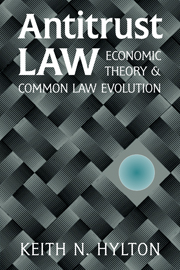Book contents
- Frontmatter
- Contents
- Preface
- 1 Economics
- 2 Law and Policy
- 3 Enforcement
- 4 Cartels
- 5 Development of Section 1 Doctrine
- 6 Rule of Reason and Per-Se Rule
- 7 Agreement
- 8 Facilitating Mechanisms
- 9 Boycotts
- 10 Monopolization
- 11 Power
- 12 Attempts
- 13 Vertical Restraints
- 14 Tying and Exclusive Dealing
- 15 Horizontal Mergers
- 16 Mergers, Vertical and Conglomerate
- 17 Antitrust and the State
- Index
5 - Development of Section 1 Doctrine
Published online by Cambridge University Press: 12 November 2009
- Frontmatter
- Contents
- Preface
- 1 Economics
- 2 Law and Policy
- 3 Enforcement
- 4 Cartels
- 5 Development of Section 1 Doctrine
- 6 Rule of Reason and Per-Se Rule
- 7 Agreement
- 8 Facilitating Mechanisms
- 9 Boycotts
- 10 Monopolization
- 11 Power
- 12 Attempts
- 13 Vertical Restraints
- 14 Tying and Exclusive Dealing
- 15 Horizontal Mergers
- 16 Mergers, Vertical and Conglomerate
- 17 Antitrust and the State
- Index
Summary
Section 1 litigation today applies two legal tests: the rule of reason or reasonableness test and the per-se illegality rule. Under the rule of reason standard, the court holds a practice unlawful only if it unreasonably restrains trade. Under the per-se rule, the court may find a practice unlawful without an inquiry into its reasonableness. What is the connection between the per-se rule and reasonableness tests? What is the connection between the reasonableness test under the Sherman Act and the reasonableness test employed in the closest common law analogue, the restraint of trade cases? This chapter aims to answer these questions.
I also try to provide some sense here of the underlying tensions shaping antitrust doctrine. The fundamental tension is between the administrative and evidentiary burdens imposed on public enforcement agents by a reasonableness standard, and the traditional tendency of courts to apply reasonableness tests in the common law process. This tradition tends to direct courts toward an inquiry into the economic reasonableness of a defendant's conduct.
THE SHERMAN ACT VERSUS THE COMMON LAW
The first Section 1 case to reach the Supreme Court was United States v. Trans-Missouri Freight Assn. Although it receives scant attention in antitrust casebooks, it is the most important federal antitrust opinion, for reasons that should become clear shortly. It involved an effort by eighteen railroads controlling traffic west of the Mississippi River to eliminate rate wars.
Information
- Type
- Chapter
- Information
- Antitrust LawEconomic Theory and Common Law Evolution, pp. 90 - 112Publisher: Cambridge University PressPrint publication year: 2003
